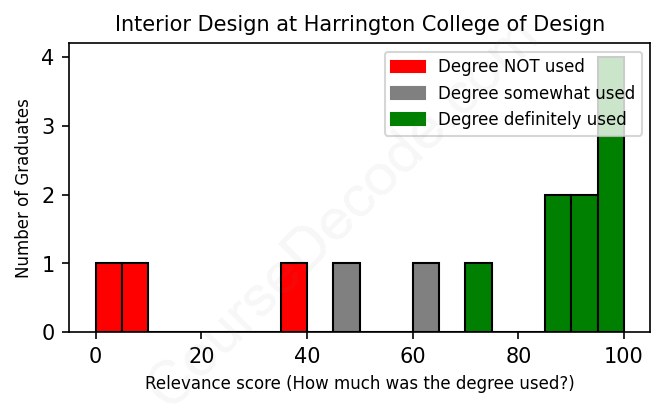
First, some facts. Of the Interior Design graduates from Harrington College of Design we've analyzed , here's how many have used (or NOT used) their degree in their career:

These are estimates based on AI analysis of 14 LinkedIn profiles (see below).
The verdict? Slightly above average. Overall, with an average relevance score of 70%, Interior Design graduates from Harrington College of Design have a slightly higher likelihood (+3%) of finding work in this field compared to the average graduate across all fields:
And for comparison, here's the chart for all profiles we've looked at across all degrees.
Also, after graduating, only 0% of these graduates have pursued further education other than another Bachelor's degree (such as a Masters degree or other), compared to the average across all profiles of 35%. This suggests a Bachelors degree is enough for most Interior Design graduates, and it's normal to look for work straight after graduation.
See the details:
|
Relevance score: 93% We think this person has gone into a career highly relevant to their degree. We think this person has gone into a career highly relevant to their degree.
DEGREE INFOGraduated in 2012 from Harrington College of Design with a Bachelor of Arts (B.A.) in Interior Design. No other secondary education since. JOB HISTORY SINCE GRADUATIONConceptual Sketcher House of Atlas Feb 2012 - Dec 2012 Freelance Designer/ Social Media  Needle Paint Oct 2012 - Jan 2013 Assistant Designer  Post 27 Feb 2012 - Feb 2013 Freelance Interior Designer  Urban Source Mar 2013 - Jun 2013 Senior Designer  NorthWest Lighting and Accents Apr 2013 - Jan 2017 Senior Interior Designer  Aaron Murphy Interiors Feb 2023 - Jul 2023 Senior Designer  Ilene Chase Feb 2017 - Present ABOUTI love to make things beautiful. I enjoy finding a balance in work and spaces. The balance and organization that creates a positive feeling. I love working in the design field and would pursue any career that utilizes my skills and gives me a chance to create and be creative. I'm great with ideas and enjoy developing from concept to creation. |
The top 10 most common jobs done by the graduates we've analyzed (ranked most common to least) are:
After checking out the LinkedIn profiles of people who graduated from Harrington College of Design, it seems like many of them ended up in roles that directly connect to their degree in Interior Design. A significant proportion of these grads took on positions like Interior Designer, Design Assistant, and Senior Designer, which are all jobs that require the skills and knowledge they picked up in school. These roles not only involve the application of interior design principles but also demand creativity and a keen eye for aesthetics—exactly what they're trained for!
However, there is a noticeable number of graduates who ventured into jobs that aren’t directly related to interior design. Roles like Administrative Supervisor, Customer Success Manager, and various project management positions often stray away from design. While these jobs might utilize some transferable skills, such as organization or project coordination, they don’t fully engage the core design knowledge students were taught. So, while many graduates are doing really relevant work in the field of interior design, a fair chunk has found their way into careers that somewhat miss the mark when it comes to directly applying their design expertise. It’s a mixed bag, but overall, there’s a solid representation of folks making their mark in the interior design industry!
Here is a visual representation of the most common words in job titles for Interior Design graduates (this is across all Interior Design graduates we've analyzed, not just those who went to Harrington College of Design):

Looking at the career trajectories of graduates from Harrington College of Design, it seems like there's a mix of pathways taken after earning their degrees in Interior Design. Many of these graduates initially find themselves in entry-level positions that are pretty relevant to their field. For example, roles like Design Assistants, Project Managers, and even Freelance Designers pop up quite frequently. This shows that right out of school, they’re diving into the industry and getting real hands-on experience with interior design projects, which is super beneficial for their growth.
Fast forward about five to ten years, and things start to look a bit more varied. Some folks stick with interior design and advance to positions like Senior Interior Designer or even open their own businesses, which is awesome and reflects a solid career path within the industry. However, there are also quite a few grads who veered off into completely different jobs that are only tangentially related, such as project management in different sectors or roles in customer success. This suggests that while a good number have successfully established themselves within the interior design field, others may have found it challenging and opted for careers that might offer more stability or diverse opportunities. Overall, it seems like a good chunk of Harrington grads end up making their mark in design, but there’s definitely a portion that drifts away from it over time.
Honestly, pursuing a Bachelor’s degree in Interior Design can be pretty challenging, but it really depends on your passion for the subject. At places like Harrington College of Design, you’re diving deep into both the creative and technical sides—think design theory, color palettes, space planning, and drafting. It’s not just about making pretty spaces; there’s a lot of work that goes into understanding how to make those spaces functional and appealing. You’ll probably have a mix of projects, critiques, and deadlines that can be stressful at times, but if you love the idea of transforming environments and have a good sense of creativity, you'll likely find it rewarding even if it can be tough. Overall, I'd say it's on the harder side of average, especially if you want to excel!
Most commonly, in the LinkedIn profiles we've looked at, it takes people 4 years to finish a Bachelor degree in Interior Design.
Looking at the career paths of these Interior Design grads from Harrington College of Design, it seems like they've had some pretty solid job opportunities, especially in the early years. Many jumped straight into roles as designers or project managers, which typically pay decent salaries compared to entry-level positions. As they climbed up the ladder, like moving into senior design roles, they likely started to earn even more. However, a few have taken detours or held less direct roles in design, and that can affect earnings. Overall, it looks like most of them, especially those sticking closely to design, are likely doing alright financially, but it really depends on the specific companies and regions they're in. It's a mixed bag, but many seem to be on a positive trajectory!
Here is a visual representation of the most common words seen in the "about" section of LinkedIn profiles who have a Bachelor degree in Interior Design (this is across all Interior Design graduates we've analyzed, not just those who went to Harrington College of Design). This may or may not be useful:

Here are all colleges offering a Bachelor degree in Interior Design (ordered by the average relevance score of their Interior Design graduates, best to worst) where we have analyzed at least 10 of their graduates:
| College | Score | Count |
|---|---|---|
 Fashion Institute of Technology Fashion Institute of Technology
|
93 | 12 |
 University of Nebraska-Lincoln University of Nebraska-Lincoln
|
92 | 16 |
 Kent State University Kent State University
|
90 | 13 |
 Savannah College of Art and Design Savannah College of Art and Design
|
89 | 21 |
 Design Institute of San Diego Design Institute of San Diego
|
89 | 10 |
 Iowa State University Iowa State University
|
86 | 13 |
 Pratt Institute Pratt Institute
|
83 | 11 |
 Cazenovia College Cazenovia College
|
79 | 15 |
 Purdue University Purdue University
|
74 | 11 |
 The Art Institutes The Art Institutes
|
74 | 20 |
 San Francisco State University San Francisco State University
|
73 | 10 |
 East Carolina University East Carolina University
|
70 | 10 |
 Harrington College of Design Harrington College of Design
|
70 | 14 |
 Texas State University Texas State University
|
67 | 11 |
 Radford University Radford University
|
47 | 10 |